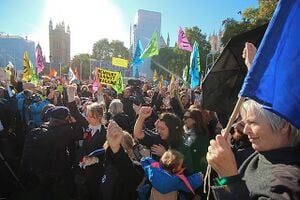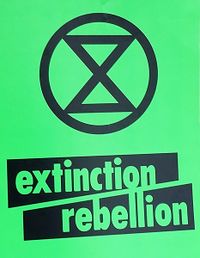
 Here Comes Everyone: XR's strategy for 2023-24 aims sees strengthening communities as the path to effective climate protest, The Daily Alternative (Jun 04, 2023)
Here Comes Everyone: XR's strategy for 2023-24 aims sees strengthening communities as the path to effective climate protest, The Daily Alternative (Jun 04, 2023)  Extinction Rebellion: Climate activists stage Earth Day demonstration, BBC News (Apr 24, 2023)
Extinction Rebellion: Climate activists stage Earth Day demonstration, BBC News (Apr 24, 2023)  Extinction Rebellion announces move away from disruptive tactics, The Guardian (Jan 01, 2023)
Extinction Rebellion announces move away from disruptive tactics, The Guardian (Jan 01, 2023)
Extinction Rebellion (abbreviated as XR) is a socio-political movement with the stated aim of using civil disobedience and nonviolent resistance to protest against climate breakdown, biodiversity loss, and the risk of social and ecological collapse.
Extinction Rebellion was established in the United Kingdom in May 2018 with about one hundred academics signing a call to action in support in October 2018, and launched at the end of October by Roger Hallam, Gail Bradbrook, Simon Bramwell, and other activists from the campaign group Rising Up!.
Citing inspiration from grassroots movements such as Occupy, Gandhi's Satyagraha, the suffragettes, Gene Sharp, Martin Luther King and others in the civil rights movement, Extinction Rebellion wants to rally support worldwide around a common sense of urgency to tackle climate breakdown.
The movement uses a circled hourglass, known as the Extinction Symbol, to serve as a warning that time is rapidly running out for many species. Special Note: This is an abbreviated version of the introductory text from Wikipedia's article. You are encouraged to read the full version. W See also next section.
About this page[edit | edit source]
Although this article shares some content from the Wikipedia article of the same name, it is not meant to be encyclopedic in the same way. There is no need to duplicate what Wikipedia does. However you are encouraged to view the Wikipedia article in full, including for example sections such as Support and Criticism. As well as, of course Extinction Rebellion's own website.
Rather this article, and any subsequent offshoots, within Community action for sustainability (CASwiki), are an opportunity to explore and hopefully contribute to, or at the very least complement community aspects of the movement. (more to follow)
Manifesto[edit | edit source]
Demands[edit | edit source]
Extinction Rebellion's website states the following aims:
- Government must tell the truth by declaring a climate and ecological emergency W, working with other institutions to communicate the urgency for change.
- Government must act now to halt biodiversity loss and reduce greenhouse gas emissions to net-zero by 2025.
- Government must create, and be led by, the decisions of a Citizens' assembly on climate and ecological justice.

Stated principles[edit | edit source]
XR states the following on its website and explains the following in its declaration:
- "We have a shared vision of change—creating a world that is fit for generations to come.
- We set our mission on what is necessary—mobilising 3.5% of the population to achieve system change by using ideas such as "momentum-driven organising" to achieve this.
- We need a regenerative culture—creating a culture that is healthy, resilient, and adaptable.
- We openly challenge ourselves and this toxic system, leaving our comfort zones to take action for change.
- We value reflecting and learning, following a cycle of action, reflection, learning, and planning for more action (learning from other movements and contexts as well as our own experiences).
- We welcome everyone and every part of everyone—working actively to create safer and more accessible spaces.
- We actively mitigate for power—breaking down hierarchies of power for more equitable participation.
- We avoid blaming and shaming—we live in a toxic system, but no one individual is to blame.
- We are a non-violent network using non-violent strategy and tactics as the most effective way to bring about change.
- We are based on autonomy and decentralisation—we collectively create the structures we need to challenge power. Anyone who follows these core principles and values can take action in the name of RisingUp!"[1]
Principles and Values[edit | edit source]
Copy of XR Principles and Values in Full, added 09:53, 3 February 2020 (UTC)
How to get involved[edit | edit source]
- Join Us: Extinction Rebellion
Local groups[edit | edit source]
- Local groups (UK and worldwide): Extinction Rebellion
Community aspects of Extinction Rebellion[edit | edit source]
(to follow)
Communities Overview[edit | edit source]
- Communities page on Extinction Rebellion, includes Resources for local groups.
References
- historical archiving,[2] but mentions:
- "Communicate a vision of a different world and to propose a draft manifesto of the changes needed, (drafts that can be improved)."
- "Making room for everyone to join in", etc.
- Rebel Starter Pack,[3] contains links to eg spreadsheets, etc., including:
- Visual Representation of the Communities Circle (?)/ Working Group, GlassFrog
- Mandates (?) spreadsheet: Community listed under Movement circle Mandate, Google Sheets
XR and future democracy[edit | edit source]
See separate article: XR and future democracy
Related groups or networks[edit | edit source]
- Music Declares Emergency, "group of artists, music industry professionals and organisations that stand together to declare a climate and ecological emergency and call for an immediate governmental response to protect all life on Earth. We believe in the power of music to promote the cultural change needed to create a better future."
- Classical Declares, "formed in April 2021 in order to expand the Music Declares Emergency working group into the worlds of classical, opera, choral and composition."
- Tourism Declares, "exists to enable everyone in tourism to implement the Climate Action Plans needed to halve sector emissions by 2030." added 19:55, 30 May 2024 (UTC)
- culture declares emergency, "a growing movement of individuals and organisations involved in arts and culture who are declaring a climate and ecological emergency. This means truth-telling, care-taking, and change-making" link checked 08:01, 22 May 2024 (UTC)
- Plastics Rebellion, added 12:22, 30 October 2023 (UTC)
- UK Community groups, extinctionrebellion.uk, aded 17:32, 6 January 2022 (UTC)
- writersrebel.com, added 15:37, 28 August 2020 (UTC)
- 7 communities listed on rebellion.global
- Doctors for Extinction Rebellion
- Extinction Rebellion Health Workers on facebook
- Architects Climate Action Network
- XR Engineers on facebook
- Learning Rebellion
- Scientists for Extinction Rebellion
Resources[edit | edit source]
Extinction Cafe[edit | edit source]
Future Democracy Tools[edit | edit source]
see: Future Democracy Hub
How to's[edit | edit source]
How to start a student group for Extinction Rebellion, Google Docs
Images[edit | edit source]
Commons:Category:Extinction Rebellion
Maps[edit | edit source]
- Find you XR group, rebellion.global
- Local groups in the UK, extinctionrebellion.uk
Other resources[edit | edit source]
- Resources on Extinction Rebellion
- Beautiful Rising
Video[edit | edit source]
More video: Extinction Rebellion on youtube
Related video[edit | edit source]
His Epic Message Will Make You Want to Save the World, on youtube.com
See also[edit | edit source]
- Climate emergency centres
- XR and future democracy
- Climate action, Climate news
- Climate emergency
- Community climate action plan
- Participatory carbon budgeting
- Open CO2
- Biodiversity, Biodiversity news
- Community involvement, Community involvement news
- Community involvement UK, Community involvement UK news
- Citizens' assembly
- List of climate assemblies
- Health and climate
- Networks, Networks, news and comment
- Peoples assemblies
- Community safety
- Occupy Sustainability
local information and news can be found, or shared, via our many location pages
External links
Extinction Rebellion W - Climate emergency declaration W - Citizens' assembly W includes sections on disadvantages as well as advantages.
- Extinction Rebellion International
- Extinction Rebellion UK
References
- ↑ W, see also Rebel Starter Pack, date not found, accessed 9/8/19
- ↑ risingup.org.uk
- ↑ Rebel Starter Pack, date not found, accessed 9/8/19








